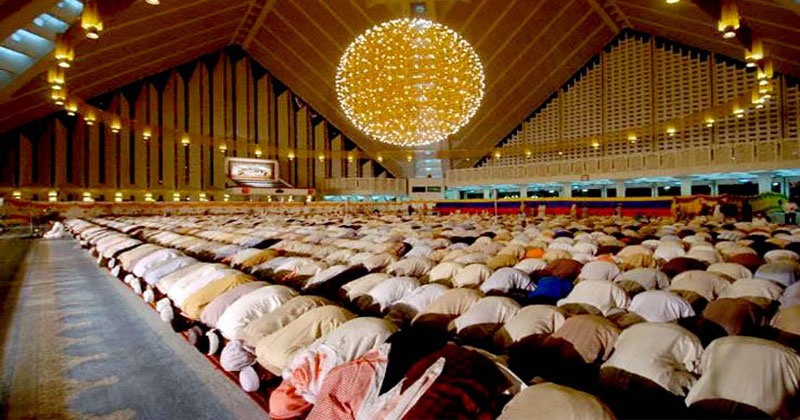
“Tarawih/ Taraweeh” is a sunnah al muakkada prayer specific to Ramadan that is 20 rakahs.
“Tarawih” is an Arabic word that is the plural of the word “Tarweeha” which literally means “to rest”. The “tarawih prayer” is named so because a brief rest is taken after each four rakahs which constitute a “tarweeha”. Five tarweeha make up a whole “tarawih prayer”.
Tarawih prayer is a sunnah of our Blessed Prophet (pbuh) that was also performed by the four caliphs after him. Performing tarawih prayer in congregation is sunnah al kifaya.
According to the three madhabs (Hanafis, Shafis and Hanbalis), tarawih prayer is sunnah al muakkad.
Madhabs propounded different views about the meaning of sunnah, mandub, mustahab and virtue.
Some are of opinion that these are synonym words; whoever performs a sunnah, a mandub or a mustahab, he will get reward, and for the one who leaves there is no punishment.
A Muslim should never underestimate sunnahs. Because the purpose of prayer (salah) is to get close to Allah Almighty (swt) who created the whole universe. Therefore, there are definite and absolute benefits of performing sunnah prayers. To save from hellfire and to utilize nimah of Paradise are its foremost benefits.
Whoever performs Tarawih prayer a palace made of ruby will be built for him in Jannah
When it is the first night of Ramadan; the doors of skies and the Paradise are opened. And This continues until the last night (of the Ramadan). Whoever (man or woman); for every sajdah that he makes one of the nights of Ramadan, one thousand seven hundred hasanah (rewards) will be recorded. A palace made of red ruby will be built for him and each of its doors will have two wings embroidered with red ruby. (Al-Ghunyat’ut-Talibin)
During Prophet Muhammad (pbuh) and Abu Bakr (ra)’s time tarawih prayers were being performed individually and this continued until the beginning of Umar’s (ra) caliphate. Upon the order of Umar (ra), tarawih prayers have been started to be performed in congregation led by Ubay bin Ka’ab (ra). Therefore, performing Tarawih prayer in congregation is called “the sunnah of Umar (ra)” (Kutub Al-Sittah)
Tarawih prayer has a different virtue for each day
Imam al-Ghazali commands about the virtue of Tarawih prayer:
It is narrated from Ali (ra)
(Who performs Tarawih prayer)
- 1st night: His all sins are forgiven.
- 2nd night: His and -if they are Mumin- his parents’ sins are forgiven.
- 3rd night: Angels proclaim and herald saying: “O, Mumin, Allah (swt) accepted your good deeds and your requests.”
- 4th night: Allah (swt) rewards him with the hasanah of those who reads the Tawrat(Torah), the Bible, the Zabur and the Quran.
- 5th night: Allah (swt) rewards him as if he performs prayer in Masjid Al-Haram.
- 6th night: Allah (swt) rewards him as if he made tawaf in Baitul Mamur.
- 7th night: Allah (swt) rewards as though he was with Prophet Musa (and helped him) when he fought Fir’aun and Haman.
- 8th night: Allah (swt) rewards him as though he accompanied Prophet Muhammad (pbuh) in the Battle of Badr.
- 9th night: Allah (swt) rewards him as though he worshipped with Prophet Dawud.
- 10th night: Allah (swt) gives safety to him both in the world and in the hereafter.
- 11th night: Allah (swt) rewards him with an accepted Umrah thawab.
- 12nd night: Whoever performs tarawih prayer this night passes from the Sirat Bridge like lightening.
- 13th night: Allah grants him like he constructed Baytullah.
- 14th night: Allah rewards him as if he stayed up for worship the whole layla-i qadr (the night of power) long.
- 15th night: Allah accepts his dua and wishes and gives high degrees in the hereafter.
- 16th night: whoever performs tarawih prayer this night says “lailaha illallah” while he is reviving from his grave in the day of judgment.
- 17th night: he sees his maqam (place) in Jannah A’la even before he goes there.
- 18th night: Allah rewards him equal to martyrs and veterans.
- 19th night: Allah helps him in this world and in the hereafter.
- 20th night: whoever performs tarawih prayer this night doesn’t leave this world without seeing prophet Muhammad in his dream.
- 21th night: all the angels on earth and in the heaven make istighfar (seek forgiveness) and he doesn’t leave the world unless Allah gives consent .
- 22nd night: Allah rewards him as if he fed widows and orphans in the Ummah.
- 23th night: Allah rewards him as if he set free the slaves in the Ummah.
- 24th night: He gets his baraah (releasing from sins) from his right hand.
- 25th night: Angel of death comes in his best appearance and blesses him with Jannah blessings.
- 26th night: Angels protects him from satan’s evils by the order of Allah.
- 27th night:Gates of Jahannam is closed by the command of Allah (swt)
- 28th night: Doors of Jannah is opened for him by the command of Allah and he enters whicever gate he wishes.
- 29th night: reward of Patience of Ayyub (as) and all his sins are forgiven.
- 30th night: A Munadi (invitor) calls from under arsh and says:
“Servants who pray tonight’s tarawh prayer is set free from jahannam. They are safe from what they fear, jahannam, and they embrace Allah’s beautiy.” Allah says: Form y grace and Glory’s sake I forgive these servants of mine. I prohibited their bodies from Fire of Jahannam.”
(?smail Hakk? – Mejalisu’l-va’z ve’t-tezkir, 88-90),(Osman al-Hobawi – Durratu’l-waizin, sh:16,17) (Muhammad Hayri, Mejalis i Hayriyya wa mafatih-? ilmiyya , 15-99)
Also Read: Things You Shouldn’t Do with Your partner in Ramadan!

Post Your Comments